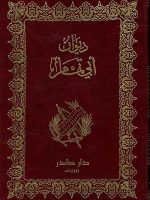Abu Tammam Habib ibn Aws ibn al-Harith al-Ta’i (188-231 AH / 803-845 AD), one of the most distinguished poets of Arabic poetry, was born in the city of Jasim (a village in Hawran, Syria). He traveled to Egypt, where he was summoned by al-Mu’tasim to Baghdad, where he received a license and placed him among the poets of his time. He resided in Iraq and then became the postmaster of Mosul, where he died after two years.
He was dark-skinned, tall, eloquent, and sweet-spoken, with a slight stutter. He memorized fourteen thousand Arabic verses, in addition to poems and fragments. Al-Suli’s account of Abu Tammam states: “He had a hoarse voice and would accompany a female narrator with a beautiful voice, reciting his poetry before the caliphs and princes.” His poetry is powerful and eloquent, and there is disagreement over who is better than al-Mutanabbi and al-Buhturi. He has written works, including Fuhuul al-Shu’ara’ (The Proud Poets), Diwan al-Hamasa (The Collected Poems), Mukhtar Ash’ar al-Qaba’il (The Selected Poetry of Tribes), and Naqa’id Jarir and al-Akhtal (The Contradictions of Jarir and al-Akhtal). It is attributed to him, but perhaps to al-Asma’i, as al-Maymani believes.
-
Abu Tammam’s Diwan Two Part
د.ا15.00This collection includes a selection of Abu Tammam’s poems, representing the pinnacle of eloquence and fluency in Abbasid Arabic poetry.
د.ا15.50
